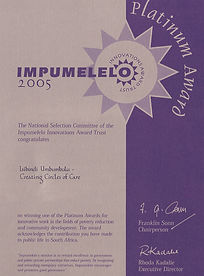

In 2001, NACCW developed the Isibindi model, meaning courage in IsiZulu, as a response to the large number of orphans and vulnerable children and youth in South Africa. At the core of the model is the development of CYCWs who provide services to children and youth in their communities.
The Isibindi model is a child-centred model which includes the assessment of the child and family, the provision of services through home visits, special programmes and Safe Parks and referrals to social service, health and other practitioners. The model contributes to improved outcomes in education, health, nutrition, socio-economic situation and child protection.
Isibindi projects deployed over 8,000 trained CYCWs nationally from 2001 to serve 1,8 million children across over 400 CBOs with prevention and early intervention services.
National Isibindi Roll-Out
During 2011, NACCW and the Department of Social Development (DSD) collaborated in the development of a five-year plan to expand the Isibindi model through a partnership between the NDSD, the provincial Departments of Social Development (PDSDs), NACCW, and local NGOs.
The Isibindi roll-out commenced in 2013 and concluded in 2018. NACCW officially handed over the model to NDSD/PDSDs in 2019 in support of DSD’s continuation of community-based prevention and early intervention services for vulnerable children. Isibindi is implemented under a new name, Risiha, through local organisations and PDSDs.
There are funders which funded Isibindi programmes before the national roll-out, or as a part of the roll-out through programmes complementing the core Isibindi interventions. These are the De Beers Fund, Mainstream Renewable Power SA, Black Mountain Mining, USAID (PEPFAR), UNICEF, FHI360 and ABSA.

Isibindi without Borders
In 2015, Isibindi Without Borders, showcased how local expertise, through the Isibindi model, could be of value to others. This is through developing collaborative relationships at an international level with a range of organisations to the benefit of vulnerable children and youth.
Isibindi Without Borders applies the learnings of Isibindi to a wider context, which at its core, is the training and development of child and youth care workers (CYCWs) to provide child and youth care services (including Safe Parks) to children and youth in their communities.
Isibindi Without Borders has been implemented in Namibia and Zambia in partnership with the United Nations High Commissioner for Refugees (UNHCR) and in Lebanon in partnership with the Himaya organisation. Across the African countries, over 100 people have been trained in child and youth care work and served thousands of vulnerable and at-risk young people.
Awards received for the Isibindi Model
2020
MTN Awards for Social Change for good M&E practice in the non-profit sector (Isibindi Model).
2013
Global Innovation Award for the founding of the Isibindi Model: Creating Circles of Care in South Africa.
2012
Larissa Award for exemplary initiatives (Isibindi model) for the well-being of children in Africa.
2007
Mail & Guardian Investing for Life Award for the Integrated Child Care Programme: The Galeshewe Isibindi Project in Northern Cape.
2005
Impumelelo Social Interventions Centre (Platinum Award) for the Isibindi Umbumbulu (KwaZulu-Natal) project.


